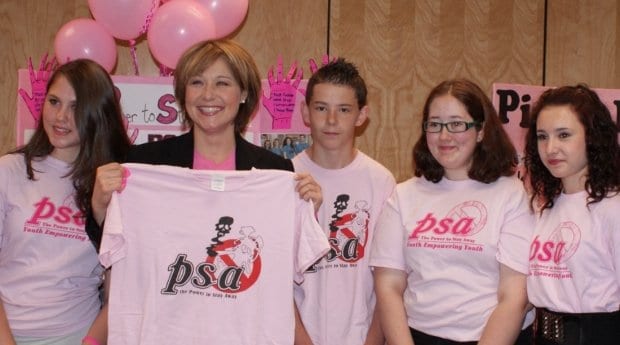I’ve shied away from saying this before but the more I see local initiatives like the Central Coast school board’s new LGBT policy, the more convinced I become that change emerges best from within local discussions, rather than imposed by distant governments.
I’ve know I’ve been calling for more than a decade for government leadership on a BC-wide school policy to explicitly prohibit homophobic harassment, address its root causes, add gay-friendly content to classrooms and support gay-straight alliances. But I’m ready to give up on our government now.
Had the BC Liberals taken decisive action in 2003, when its safe schools report first documented homophobia (yet offered no recommendations to address it), it would have been a different story. A province-wide policy introduced then would have framed the public debate and emphasized to all British Columbians the importance of recognizing and valuing our queer students. But that didn’t happen.
After two half-hearted attempts to introduce a safe schools act that might have explicitly prohibited anti-gay discrimination, the BC Liberals finally passed a watered-down bill in 2007 that ordered all school districts to introduce codes of conduct consistent with the BC Human Rights Code, but stopped short of requiring policies to specifically address homophobia.
The Liberals’ equally generic ERASE Bullying strategy, introduced to much fanfare in 2012, is equally unlikely to erase homophobia, let alone tackle its root causes.
Given all these missed opportunities, it’s hardly surprising that only 29 of BC’s 60 public school districts had voluntarily passed anti-homophobia policy by 2014.
What is surprising to me is that we hit the halfway point last year and now stand just shy of the two-thirds mark. Without government direction.
The number of school districts with anti-homophobia policy hit 39 out of 60 on April 14 with a particularly comprehensive policy from a tiny district serving a remote part of BC’s central coast in the Bella Coola valley.
Forget the government. We’re winning over our neighbours’ hearts and minds, district by district.
James Chamberlain is way ahead of me. He stopped waiting for government action years ago.
Even before he took the Surrey school board to court for banning gay books in 1997, Chamberlain was quietly working behind the scenes on resources for BC Teachers’ Federation members to show their local school boards, to help convince them to pass policies to protect and value their queer students.
Initially he, too, had hoped the government would step up. In 2004, shortly after the disappointment of the BC Liberals’ safe schools report, Chamberlain told me the government “has to take a leadership role” because a handful of teachers can’t change their homophobic school cultures alone.
But they can. And they have been, one district at a time, through genuine discussions on the ground with their neighbours.
“I’m not waiting for a government to act,” Chamberlain told me last year. Besides, he said, the policies passed locally by queer teachers, straight allies and students are more effective than anything the government could come up with.
“A top-down order approach mandates things on boards and on teachers,” he said. “If teachers are moving forward on something because of a change in their hearts and their minds — that’s much more powerful.”
“I think in the next couple of years we’ll pass a tipping point: more boards with policies that without,” he added.
We’re there now. And I’m finally willing to trust in the power of genuine persuasion at a community level, neighbour to neighbour — rather than demanding top-down implementation of poorly understood, resisted orders.
Of course, for the generation of queer students who’ve had to endure the last decade without support, the pace of change no doubt seems slow.
As gay NDP MLA Spencer Chandra Herbert told me in March, after Alberta unexpectedly ordered all its schools to support gay-straight alliances, kids may be resilient but should we really leave them to fend for themselves in often-hostile environments while we wait for district-by-district change to reach them?
“For me, that’s not adequate,” he said, pushing the BC Liberals to take a page from Alberta and show some province-wide leadership. “I think we’ve got to treat this with urgency.”
Fair enough. I never meant to abandon queer students or ask them to wait patiently while we get to them. But I have come to believe that genuine dialogue within local communities that leads to jointly crafted solutions is the key to lasting change.
Look at the Central Coast school board and its new policy that, in addition to protecting its LGBT students from homophobic harassment, also recognizes their right to dignity and self-expression and says their families and communities should be valued and affirmed.
For that matter, look at the upcoming “Someone Like Me” conference in Squamish, organized by parents, students and allies to provide an opportunity for open discussion with their neighbours. “When people are free to ask questions,” co-organizer Margo Dent tells me, a community can move forward together.
Here’s to more communities of neighbours who trust each other enough to ask questions and move forward together. With or without direction from an irrelevant government too reluctant to risk votes on social change.
Robin Perelle is the managing editor of Daily Xtra in Vancouver.
What do you think? Should we keep pushing the BC government for direction, or rely on local community initiatives? Share your thoughts on our Facebook page.
Legacy: December 6, 2016 12:00 amThe safe schools report first documented homophobia in 2003, not 2004.

 Why you can trust Xtra
Why you can trust Xtra


